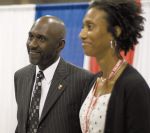Hundreds of people turned out at the Diabetes Expo held Sept. 12 at the David Lawrence Convention Center, sponsored by the American Diabetes Association. Attendees were treated to a day of education that included workshops, entertainment, free Screenings and a host of interactive booths.
 |
| PREVALENCE OF DIABETES—Dr. Jolene Brown, right, and Dr. Christopher Allen of UPMC, inform the audience about the prevalence of diabetes in the African-American community.
|
Diabetes is a disease that develops due to the body’s inability to use insulin which helps convert food into energy. The American Diabetes Association reports that 23.6 million children and adults are affected by diabetes. Of that alarming number, 2.7 million are African-Americans over the age of 20. These statistics cannot be ignored.
“I am the poster child for doing all the things you shouldn’t,” said Kim Herd, ADA community volunteer, while sharing her personal story during the Diabetes in the African American Community workshop. After finding out that she had diabetes, Herd changed her lifestyle. Healthy eating, exercise and becoming an active patient with her physician are how she now properly manages being a diabetic.
“Depression, Denial and Dealing Day to Day” were the topics discussed in the workshop. Cardiologist Dr. Chris Allen quizzed the audience to see who knew their hemoglobin ALC, LDL, cholesterol, and blood pressure readings. Participants proudly yelled out their numbers, many of which were in acceptable ranges for proper diabetes maintenance. Allen encouraged attendees to be informed consumers so they can ask the correct questions. Endocrinologist Dr. Jolene Brown echoed his advice indicating that 90 percent of the responsibility is for patients to learn how to manage their diabetes properly.
Diabetes can affect other areas within the body and therefore is viewed by many as an overwhelming disease. Due to the enormity of the disease, depression is common. Psychiatrist Dr. Mark Miller spoke to workshop attendees about depression and how to deal with the emotions that come with being a diabetic. Janis McCoy, a workshop attendee, explained to Miller the sad feelings that she has at times, indicating she felt the disease was some sort of punishment. Miller comforted McCoy by explaining her feelings are common and she was not alone. He went on to encourage her to join a support group like Centers for Healthy Heart and Souls. Healthy Heart and Souls is a nonprofit organization that help people manage their disease through education and outreach. Meetings are held at six locations throughout the community. To attend a meeting in your neighborhood, contact Jerry Allen, RN, at 412-371-3282.
When asked if she thought the expo was beneficial, McCoy stated, “I am comfortable with my disease. Speaking with the various experts made me feel at ease.”
Diabetes is a disease that can affect all races, ages, and gender. The Diabetes Expo was a wonderful event that helped educate people about every area of the disease. Attendees left empowered with valuable education and resources to live longer, healthier lives.
If you are a diabetic or know someone who can benefit from additional information, visit the American Diabetes website at www.diabetes.org. or call 1-800-342-2383.
Divabetics
Who said you had to be a Hollywood celebrity to be a diva. The Divabetic movement started in 2004 with founder Max Szadek, personal assistant to the late great singer Luther Vandross. Divabetics was a hit on the main stage at the Diabetes Expos. He encouraged women to manage their diabetes step by step with inspirational music from recording artists Whitney Houston, Mary J. Blige, and of course Luther Vandross. The women laughed, played games, met new friends and won prizes. Most importantly, they learned that life doesn’t stop because you have diabetes. Szadek encouraged attendees to eat the proper food, stay fit, care about yourself, and show confidence.
For more information about Divabetics, visit their website at www.divabetic.org
Prevalence
•African-Americans are 1.6 times more likely to have diabetes than non-Latino whites.
•25 percent of African-Americans between the ages of 65 and 74 have diabetes.
•One in four African-American women over 55 years of age has diabetes.
African-Americans and diabetes-related complications
African-Americans experience higher rates of at least four serious complications of diabetes: cardiovascular disease, blindness, amputation and end stage renal disease (kidney failure).
(Source: American Diabetes Association)